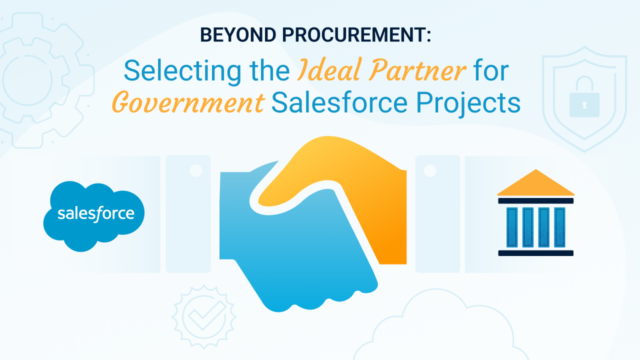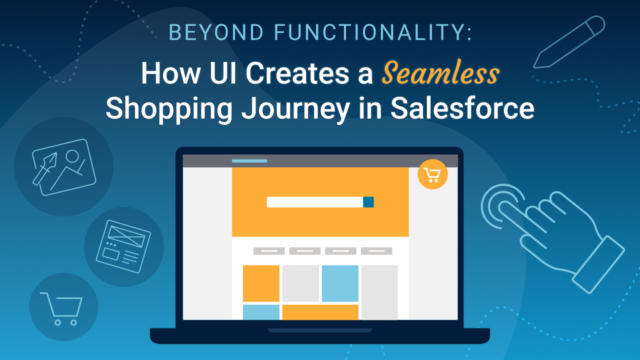The public sector, especially the government, continually strives to provide high-quality and secure services in an ever-changing environment. So whether at the federal, provincial, or municipal level, there are numerous factors to consider when choosing the right partner for the implementation of your Salesforce projects.
The government must balance several competing priorities, shifting timelines, intricate procurement processes, and often lengthy approval processes to implement policies and projects. Once these hurdles are overcome, the ideal outcome is a straight-forward project that can provide a successful use case for future work.
Whether you require a partner for a specific Salesforce project, Managed Services support, system replacement or upgrade, or overall optimization of public-facing services, choosing the right partner is crucial. So, how do you go about selecting your perfect match?
While the exact list of considerations will vary somewhat based on the project, there are some baseline requirements that should be universal. Here are the 6 key considerations when selecting a partner for government projects:
1. Experience & Expertise:
The partner should have a deep understanding and experience in implementing Salesforce solutions within the Public Sector. They should understand the unique needs and challenges of the sector.
Some relevant questions here could include:
- Has the partner successfully completed similar projects for the government in the past?
- Does the partner have recent/current experience doing so? (You want to consider prioritizing a partner that has several years of specialized experience, versus one who does a little bit of everything.)
- Is the scope and scale of the partner’s past projects comparable to this project? (A partner should have demonstrated experience within a government of similar project size and scale)
2. Certifications:
Check the Salesforce certifications that the partner holds. Certifications are a good indicator of a partner’s competence and commitment to quality.
Some relevant questions here could include:
- How many certifications does the partner hold? Which certifications do they hold? (A partner should be able to provide proof of expertise.)
- Does the partner have experts on their team in a wide range of fields/specialties? (A partner should have a highly experienced team whose day-to-day consists of ensuring the success of government projects.)
3. Reputation & References:
Look for a partner with a positive reputation in the industry. Ask for references from previous clients, particularly those in the broader public sector and government.
Some relevant questions here could include:
- Can the partner provide you with glowing government references that speak to their ability to successfully complete similar work? (A partner should be able to connect you with a relevant reference that can talk you through their experience.)
- Is the partner well-known within the Salesforce community, industry and/or sector? (A partner should be able to demonstrate leadership within the Salesforce community.)
- What does the Partner’s Salesforce AppExchange listing look like? Is it populated with relevant information and client reviews? (A reliable partner will keep their AppExchange listing up-to-date and showcase their skillsets.)
4. Approach & Methodology:
Ensure that the partner offers a clear approach and methodology that fits with your culture and suits your needs. This is crucial for the smooth operation of Salesforce solutions as time goes on.
Some relevant questions here could include:
- What Managed Services support options does the partner provide? (A partner should provide a detailed approach to support, as you work towards an ideal future state.)
- What is the partner’s approach and methodology on training, maintenance and ensuring future-proof solutions? (A partner should provide an approach that is measured, effective, and proven to work.)
5. Privacy & Security:
Ensure that any partner has advanced security protocols and policies, and are constantly evolving these to meet regulatory needs.
Some relevant questions here could include:
- Is the partner SOC II Type 2 certified?
- Does the Salesforce partner host all data within North America? (A partner should maintain the highest levels of security possible, and demonstrate a comprehensive understanding of the proper management of sensitive government information.)
- Does the Salesforce partner ensure their team goes through regular background checks? (Security isn’t just about data – you want to ensure that you can trust your partner’s full team.)
6. Cost:
Consider the cost of the services. The cheapest option isn’t always the best, but you should make sure you’re getting good value for your money.
Some relevant questions here could include:
- Does the partner provide a fixed rate or do they bill by the hour? (You want to ensure that there are no surprises and/or hidden costs.)
- How does the partner manage costs and communicate during the duration of the engagement? (A partner should have a clear and proven communications plan to ensure updates and changes are monitored and provided to your team effectively.)
Launching government projects, whether small or large scale, can be a complex process. However, with the right partner, it can feel easy. Your Salesforce and systems partner should offer peace of mind, regular communication, and efficient, proactive solutions tailored to meet your unique needs. Choosing the right partner from the beginning will save time, money, and prevent potential problems in the future, setting your organization up for success with your Salesforce projects.
Questions? Need Advice? We’d be happy to chat with you as you work through your selection process.
Stay tuned for an in-depth breakdown of Salesforce’s Public Sector Solutions, coming soon!



